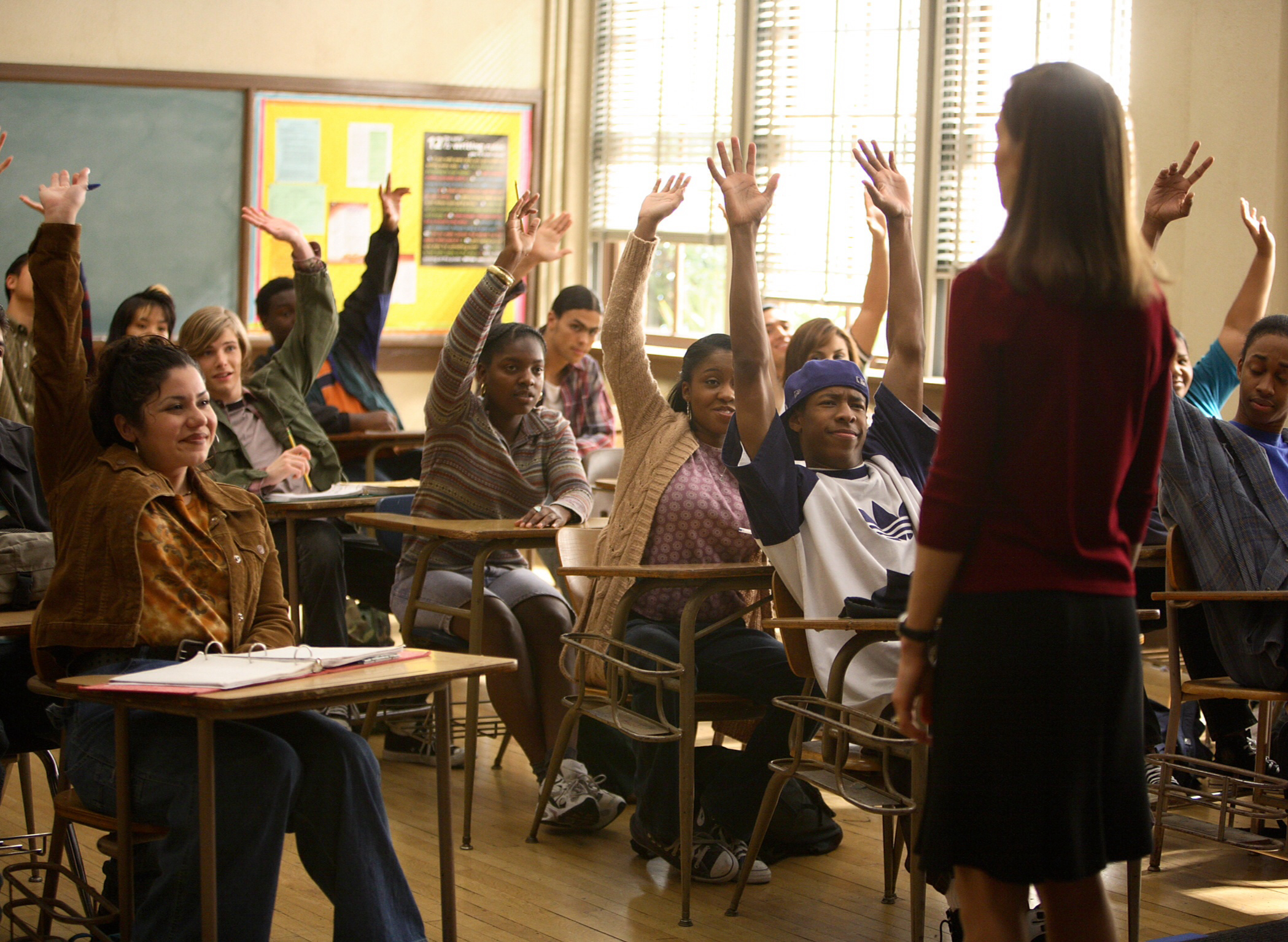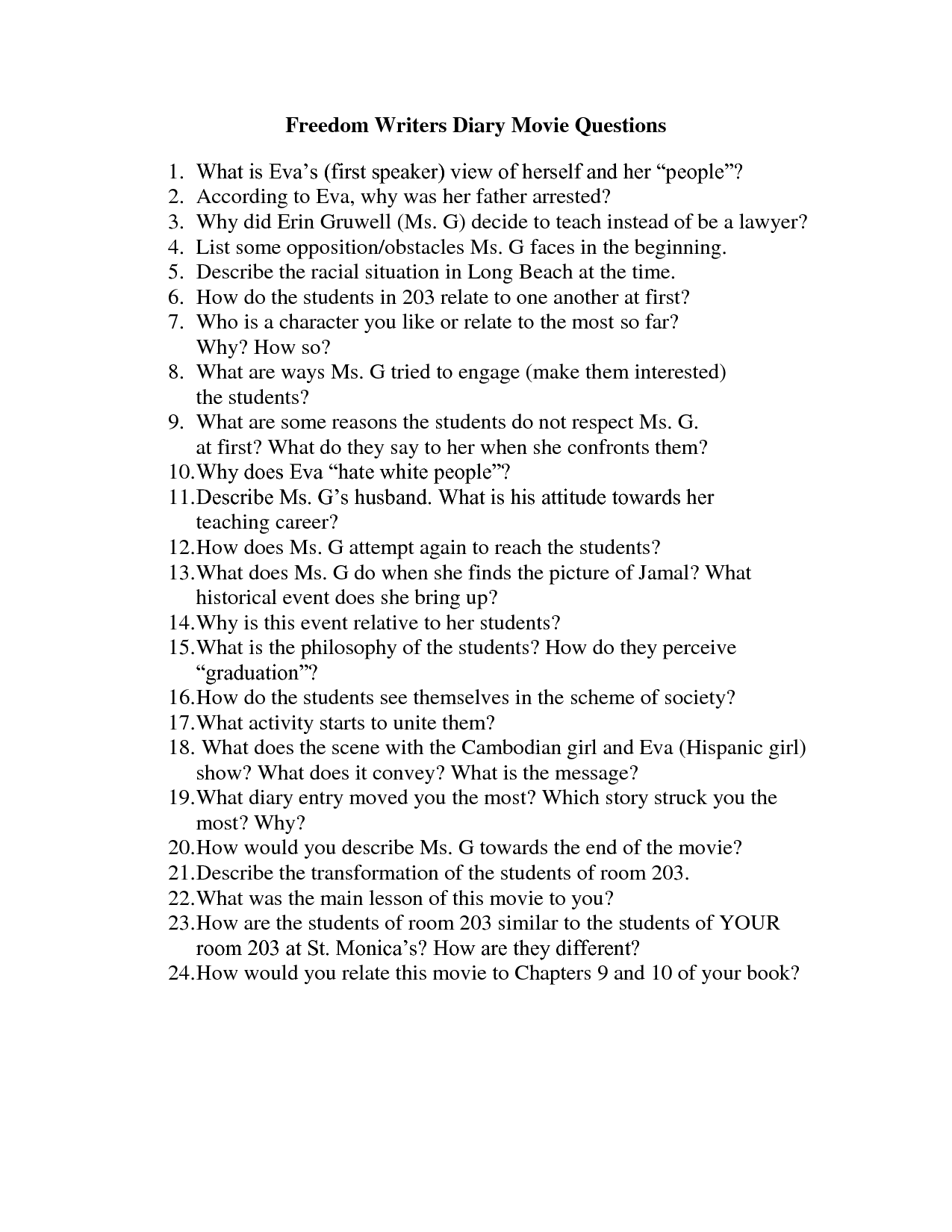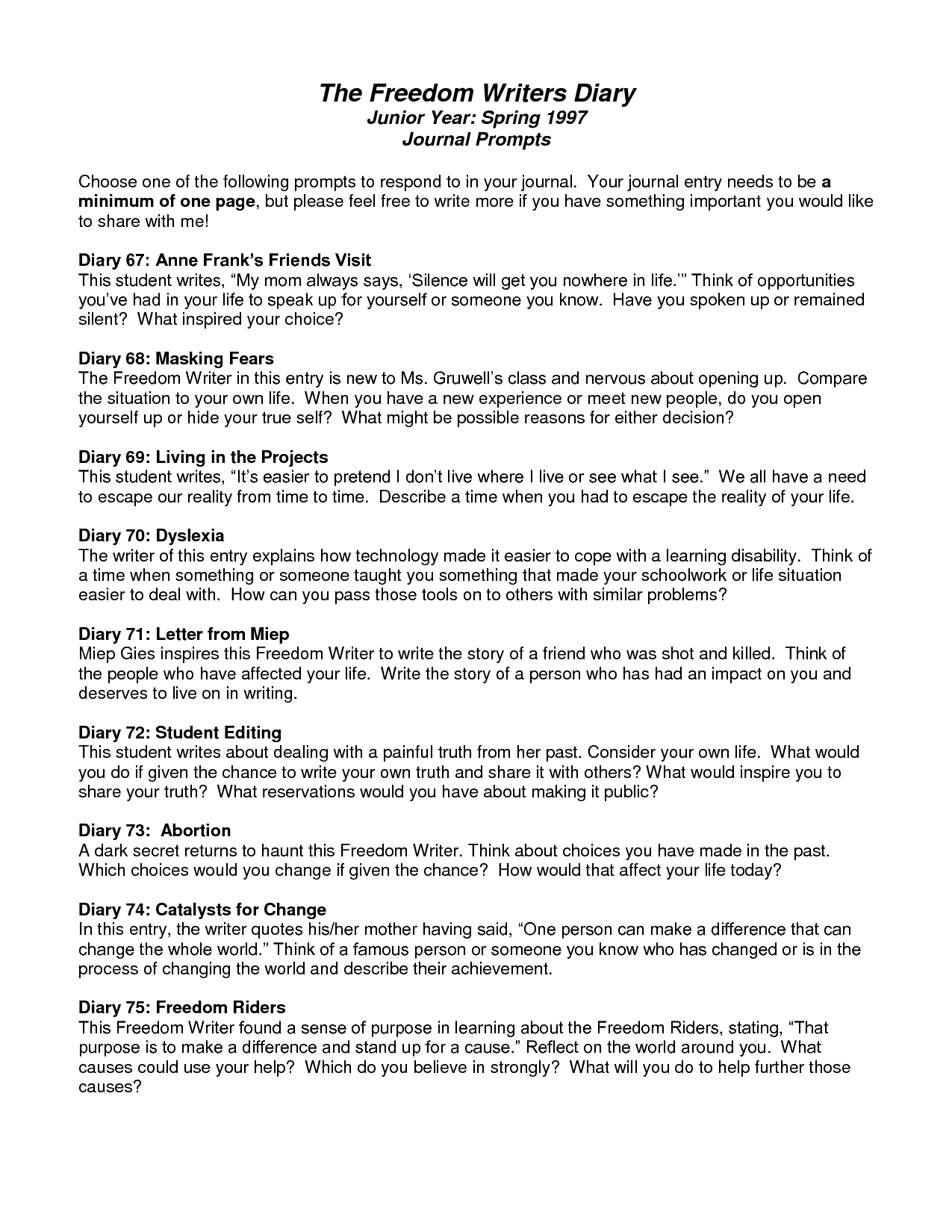Have you ever felt truly stuck, like circumstances were holding you back from what you could be? It's a feeling many of us know, whether it's personal struggles or, perhaps, the constant pull of digital noise. That, in a way, is a core feeling explored in `the freedom writers diary`, a story that really shows how people can break free from tough situations. This powerful account, based on true events, gives us a very clear look at how a dedicated teacher helped a group of students, written off by many, find their own voices and, in doing so, find a new path forward.
The story of `the freedom writers diary` isn't just about a classroom; it's also about a deeper kind of liberty, a release from the chains of prejudice and low expectations. It's about finding the inner strength to change your own narrative, which, you know, is something we all aspire to in some part of our lives. The students, facing a lot of adversity, discovered that their stories mattered, and that sharing them could, in some respects, be a powerful act of defiance against a world that had often overlooked them.
Thinking about this kind of personal liberation, it reminds us a little of how we seek freedom in other parts of our lives, too. Just as those students needed a clear space to grow and express themselves, we, in our busy world, sometimes need to create our own focused zones. It's almost like, when you clear away the constant pings and notifications, you create a mental space where your own thoughts and ideas can really take root and flourish. That, to be honest, is a form of freedom in itself, isn't it?
- Is Watching Porn Cheating
- How To Slide Head First Into Jaws Of
- Unlocking The Story Behind Nba Rising Star Max Christies Family
- Unveiling Dayanara Torres Height Biography Weight Age And Net Worth Revealed
- Unsolved Mystery The Disappearance Of George Skiadopoulos In The Julie Scully Murder Case
Table of Contents
- The Story Behind The Freedom Writers Diary
- A Classroom Transformed: Erin Gruwell's Approach
- The Power of the Diaries and Shared Stories
- Lessons from The Freedom Writers for Our World Today
- Finding Focus in a Distracted World: A Modern Freedom
- Frequently Asked Questions About The Freedom Writers Diary
The Story Behind The Freedom Writers Diary
The true story that inspired `the freedom writers diary` began in 1994 at Woodrow Wilson High School in Long Beach, California. This was a time, you see, of significant racial tension and gang violence in the area. Erin Gruwell, a new English teacher, walked into a classroom of students who were, by and large, labeled "at-risk." These young people, often from different backgrounds and rival gangs, typically saw little hope for their futures and, in a way, had little trust in the education system itself.
Many of these students had experienced trauma and hardship that most adults could barely imagine. Their daily lives were filled with challenges that went far beyond typical school worries. They were, in essence, fighting for survival, and school often felt like just another place where they were misunderstood or judged. So, Ms. Gruwell faced a pretty tough situation, a room full of young people who had, quite frankly, built walls around themselves.
The system, in some respects, had already given up on them, placing them together in what was called a "remedial" class. The general feeling was that these students were beyond help, that they couldn't learn, or that they just didn't care. That, you know, is a very sad assumption to make about any group of young people. But Ms. Gruwell saw something different; she saw potential, and a need for connection, which is really what good teaching is all about, isn't it?
- Archduchess Marie Valerie Of Austria
- Unraveling The Mystery Nicole Moraccini Missing Case Update And Biography
- Unveiling The Dynamics Of Heidi Swedbergs Net Worth From Rise To Fluctuations
- Who Is Michael Symon Brother Sister Nikki
- Devin Gibson Website Your Trusted Source For Tech Insights
A Classroom Transformed: Erin Gruwell's Approach
Erin Gruwell didn't just teach English; she taught life. Her approach was, in a word, unconventional, and it really pushed against the usual methods. She started by giving each student a composition book, a simple diary, and encouraged them to write about their experiences, their thoughts, and their feelings, without judgment. This act, basically, gave them a safe space to express themselves, something many of them had never had before.
One of the most powerful moments, as a matter of fact, was the "line game." Ms. Gruwell drew a line on the floor and asked students to step up to it if they had experienced certain hardships, like knowing someone who had been shot, or being abused. As students saw others step forward for the same reasons, they realized they were not alone. This simple exercise, in a way, broke down barriers and built a sense of shared humanity among them, which was truly remarkable.
She also brought in books and guest speakers that mirrored the students' lives, like Anne Frank's diary, which resonated deeply with their own experiences of persecution and survival. This was, in fact, a crucial step. By connecting their personal stories to larger historical narratives, she helped them see their struggles as part of a bigger human story. It's almost like, they started to understand that their pain was not unique, but rather a shared experience that could be overcome.
The Power of the Diaries and Shared Stories
The diaries themselves became a powerful tool for self-discovery and connection. Through writing, the students processed their trauma, expressed their anger, and, in time, began to dream of a different future. These personal writings, later collected and published as `the freedom writers diary`, really gave the world a raw, honest look into their lives, which was pretty brave of them.
Sharing these stories, even anonymously at first, fostered an incredible sense of community in the classroom. They learned to listen to each other, to empathize, and to support one another. This was, you know, a huge shift from the constant conflict and distrust that had defined their lives outside the classroom. The act of writing, and then sharing, created a bond that transcended their previous divisions.
The students, in a way, became their own teachers, learning from each other's experiences and perspectives. They discovered that words held immense power, not just for expressing pain, but for building bridges and inspiring change. This collective effort, basically, transformed a group of isolated individuals into a cohesive, supportive family, which is something very special indeed.
Lessons from The Freedom Writers for Our World Today
`The freedom writers diary` offers so many important lessons that are still very relevant today. One big takeaway is the immense power of empathy. Ms. Gruwell didn't just teach subjects; she taught her students to understand each other's pain and to see past superficial differences. That, you know, is a skill we could all use more of in our increasingly divided world.
Another key lesson is the importance of giving everyone a voice. Every person, regardless of their background, has a story that matters, and a perspective that can enrich others. When people feel heard, they feel valued, and that feeling can spark incredible change. It's almost like, when you offer someone a chance to speak their truth, you empower them in a very deep way.
The story also shows us the incredible resilience of the human spirit. Despite facing immense obstacles, these students found the strength to overcome their pasts and build brighter futures. This resilience, in some respects, is a testament to the idea that with the right support and a belief in oneself, anything is possible. It really makes you think, doesn't it, about what we are truly capable of.
This tale, you see, also highlights the transformative potential of education. It's not just about facts and figures; it's about fostering critical thinking, encouraging self-expression, and providing tools for personal growth. A good education, in fact, can be a pathway to a different life, offering opportunities that might otherwise seem out of reach. We can learn more about digital detox, which helps us make space for such learning.
Finding Focus in a Distracted World: A Modern Freedom
Thinking about the students in `the freedom writers diary` and their journey to find their voice, it makes you consider what kind of "freedom" we seek today. For them, it was freedom from violence and prejudice, a chance to learn and grow without constant fear. For us, in our very connected world, a different kind of challenge often arises: the struggle for focus. It's almost like, our minds are constantly pulled in so many directions.
Just as those students needed a safe, clear space to write and reflect, we, too, need to create environments that allow for deep concentration. The constant alerts, the endless feeds, the sheer volume of information can, you know, really make it hard to settle down and do meaningful work or learning. This digital noise can, in a way, become its own form of limitation, keeping us from truly engaging with what matters most.
That's where the idea of finding freedom from digital distractions comes into play. Tools that help you block distracting websites and apps on any device can be a real help. They make those boundaries easier to keep, so you don’t have to do it alone. This kind of help allows you to be more focused and productive, giving you back control over your time and attention. It's a bit like, creating your own quiet classroom in a noisy world, allowing your thoughts to flow freely.
The original and best website blocker, a tool like Freedom, helps you create that much-needed space. It syncs blocks across all your devices, whether it's your Mac, Windows PC, Android phone, or iPhone. With features like custom blocklists, you can really tailor your environment to support your goals. This, in some respects, gives you the liberty to choose focus, to choose to engage deeply with your tasks, and to choose to learn and grow without constant interruption. It's about empowering yourself to truly boost productivity and achieve your personal best.
It's about uncovering the truth about digital distraction and its impact on your life, and then taking steps to regain control. Just as the Freedom Writers found their voice by clearing away the external chaos, we can find our focus by managing the digital noise. This choice, to be honest, is a powerful step towards personal freedom in our modern lives. You can easily install Freedom to block distracting sites, apps, or the entire internet on all your devices, which is pretty handy.
Frequently Asked Questions About The Freedom Writers Diary
What is the true story behind `the freedom writers diary`?
The true story behind `the freedom writers diary` centers on Erin Gruwell, an English teacher at Woodrow Wilson High School in Long Beach, California, starting in 1994. She worked with a group of 150 "at-risk" students, many of whom were from diverse backgrounds and involved in gang conflicts. Ms. Gruwell inspired them to keep journals, or diaries, about their lives, their struggles, and their hopes. These personal writings, along with her unconventional teaching methods like the "line game" and reading Anne Frank's diary, helped the students overcome prejudice and achieve academic success. Their collective writings were later published as a book, which then inspired the movie.
How did `the freedom writers diary` impact its students?
The impact of `the freedom writers diary` on its students was truly profound. Through writing their personal stories and sharing them, they found a voice and a sense of belonging that had been missing from their lives. The process helped them to process trauma, understand each other's experiences, and build empathy across racial and gang lines. Many of these students, who were initially expected to drop out, went on to graduate from high school and attend college, breaking cycles of poverty and violence. The classroom became a safe haven where they learned to trust, to hope, and to see a future for themselves beyond their immediate circumstances.
What lessons can we learn from `the freedom writers diary` today?
From `the freedom writers diary`, we can learn many valuable lessons that are still very relevant. First, it teaches us about the transformative power of empathy and understanding others' perspectives, even those very different from our own. Second, it highlights the importance of giving every individual a voice and creating spaces where they feel safe to express themselves without judgment. Third, the story shows the incredible resilience of the human spirit and how belief in oneself, supported by a caring mentor, can lead to overcoming immense adversity. Finally, it reinforces that education, when approached with compassion and relevance, can be a powerful tool for personal and societal change, fostering true freedom and potential.
For more detailed information about the foundation and its ongoing work, you might want to visit the Freedom Writers Foundation website.
Related Resources:



Detail Author:
- Name : Willa Lynch PhD
- Username : kari.smith
- Email : napoleon23@hotmail.com
- Birthdate : 2003-12-24
- Address : 7392 Rath Causeway Suite 882 East Ilianamouth, CT 51671-7828
- Phone : 828.223.8961
- Company : Goyette-Konopelski
- Job : Battery Repairer
- Bio : Voluptate similique fuga facilis totam. Dolorem exercitationem reprehenderit nostrum eos. Nam dolor quis facilis laudantium.
Socials
linkedin:
- url : https://linkedin.com/in/mertzj
- username : mertzj
- bio : Labore ipsa eius similique iusto.
- followers : 3263
- following : 1707
tiktok:
- url : https://tiktok.com/@joellemertz
- username : joellemertz
- bio : Qui autem unde et ea. Et possimus sequi neque ad corporis cum.
- followers : 1667
- following : 13
facebook:
- url : https://facebook.com/jmertz
- username : jmertz
- bio : Ut in officiis enim aut omnis quae nesciunt.
- followers : 4417
- following : 2323
twitter:
- url : https://twitter.com/joelle.mertz
- username : joelle.mertz
- bio : Et repudiandae illum vitae repudiandae. Possimus ipsa iure et quis ea tempora.
- followers : 2346
- following : 2488
instagram:
- url : https://instagram.com/joelle8089
- username : joelle8089
- bio : Quos maiores id ut et. Est quas sit dolor voluptas. Ut itaque facilis placeat est.
- followers : 4687
- following : 2325